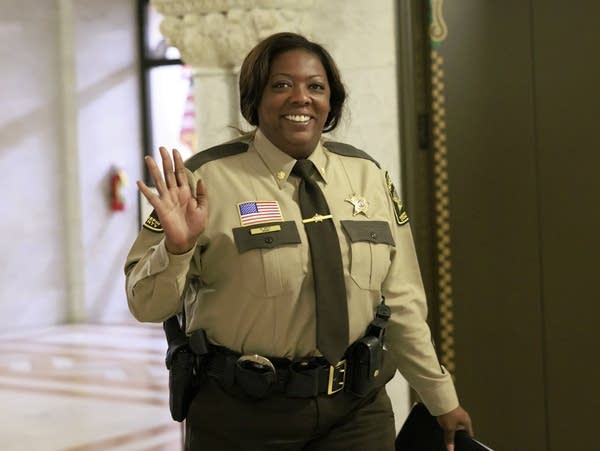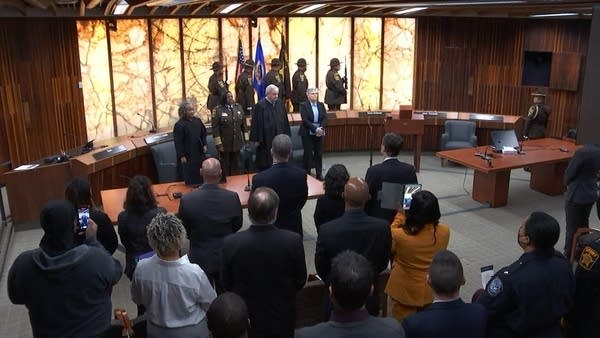'I bring a holistic view': Q&A with Dawanna Witt, new Hennepin County sheriff

Go Deeper.
Create an account or log in to save stories.
Like this?
Thanks for liking this story! We have added it to a list of your favorite stories.
There's a new sheriff in town: Dawanna Witt was sworn in as Hennepin County Sheriff on Tuesday.
She's the first woman and the first Black person to lead the department. She takes the helm following a period of deep scrutiny of law enforcement and a year of high crime.
What’s her vision for the role? All Things Considered sat down with Witt for a Q&A on Wednesday, her first day on the job.

What are your plans for the first 100 days in office?
Recruitment and retention is huge. You know, this is an honorable profession, and we want to recruit from those who live in our communities that we serve. Combatting violent crime, that's another huge thing, as well as getting busy with the community advisory board — I think that's going to be very important. I am someone who believes very deeply in collaborations and we need to make sure that those conversations are ongoing so that we have the best idea of what the community is wanting from us.
Turn Up Your Support
MPR News helps you turn down the noise and build shared understanding. Turn up your support for this public resource and keep trusted journalism accessible to all.
Looking back on this election, how will you tread the line between what some call ‘soft on crime’ vs. ‘tough on crime’ approaches?
Combatting violent crime and reform: We can do both. We can't have people talking about one or the other. I believe that we can do both. I do believe that we do need to restructure our profession in certain ways, but I also believe that we need accountability.
What about jails? What are your priorities there? What issues do you see?
Well, something I've been seeing along my campaign line is jail time should not be dead time. We have people's attention in jail, and so sitting around and doing nothing is not an option. We need structure in jail. For example, our whole program — which stands for helping others by providing education and giving educational assistance to people — you know, we also have our free writers program, where people are able to learn in creative writing and writing about what they're feeling. And I will build on those programs so that we can do our part of when people are released, having a better chance of being successful citizens out there.

You are a former social worker; you're the first Black, first female sheriff in Hennepin County. What do you bring to the office that past sheriffs haven’t?
What I bring into the office is a lot of lived experiences, you know, being a child who was raised seeing a lot of things that kids should not see — whether it was violence, drugs, alcoholism, mental health that went unaddressed. And I bring that passion, and that remembrance of how it made me feel or the effect that had on my family. I bring that with me. I bring a holistic view. I also bring the view as someone who was very well educated, you know, not just the first Black female but very well educated with a lot of lived experiences, and a lot of tools in her toolbox to be fluid as I respond to the various things that are going on in our community.
County Attorney Mary Moriarty was also sworn in this week. Do your visions match up? How do you see working with her?
You know, Mary Moriarty is the elected official. I work well with most, if not all, people. You know, we have some of the same goals: We want a safer community. We might have different ways of what that looks like, but I’m very aware of what my job is to do, as a person who enforces the laws. I really want people to know that they are safe.
You say you want people to feel safe, but what about people who don't feel safe when engaging with law enforcement?
Yeah, you know, we have to acknowledge that and I can tell you I did grow up being fearful of law enforcement because of my own lived experiences, not personally with me, but family members. It took me to actually work with people, the men and women who wear uniforms and badges, to combat any fears. So I can be that person who can speak from both sides of that fence.


